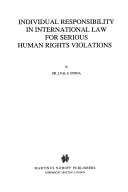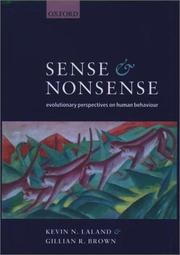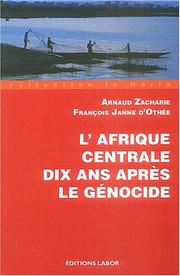| Listing 1 - 10 of 20 | << page >> |
Sort by
|
Book
ISBN: 2874030953 9782874030956 Year: 2003 Volume: *3 Publisher: Bruxelles: La charte,
Abstract | Keywords | Export | Availability | Bookmark
 Loading...
Loading...Choose an application
- Reference Manager
- EndNote
- RefWorks (Direct export to RefWorks)
Women --- Genocide --- Rape --- Femmes --- Génocide --- Viol --- Legal status, laws, etc. --- Social conditions --- Droit --- Conditions sociales --- 341.48 <675.98> --- 396 --- Misdaden tegen de mensheid. Volkerenmoord--Ruanda. Rwanda --- Feminisme. Vrouwenbeweging. Vrouw en maatschappij --- 396 Feminisme. Vrouwenbeweging. Vrouw en maatschappij --- 341.48 <675.98> Misdaden tegen de mensheid. Volkerenmoord--Ruanda. Rwanda --- Génocide --- RWANDA --- DROITS DE L'HOMME --- GENOCIDE

ISBN: 9041112227 9789041112224 Year: 1999 Publisher: The Hague: Kluwer law international,
Abstract | Keywords | Export | Availability | Bookmark
 Loading...
Loading...Choose an application
- Reference Manager
- EndNote
- RefWorks (Direct export to RefWorks)
In this revised edition, Professor Bassiouni persuasively establishes the legal validity of the Nuremberg Charter and describes the evolution of `crimes against humanity' from 1945 to the 1998 ICC Statute. The book's comprehensive historical and legal analysis starts with the origins of this crime in the international regulation of armed conflicts and covers the Nuremberg, Tokyo and Allied Prosecutions after World War II, and subsequent national prosecutions, as well as the Statutes of the ICTY, ICTR and their jurisprudence, and the Statute of the ICC. The Nuremberg Charter first established `crimes against humanity' in positive international criminal law, but it raised lingering legal issues. The book examines the ten different international legal formulations which were developed at that time, particularly their overlap with genocide and war crimes, and sorts out the confusion regarding the legal characteristics of this crime. The meticulous and thorough analysis of all relevant legal issues, many of which are not covered elsewhere, includes: principles of legality, criminal responsibility for decision-makers and others, command responsibility, obedience to superior orders and other defences, specific contents and their counterpart in national laws, policy considerations, and the applicability of this crime to non-State actors. The wealth of information and detailed discussion of international and national prosecutions and their failures make a compelling case for more effective enforcement in the future. The author brings to this book his well-known scholarship and unique practical experiences as Chairman of the UN Commission that investigated these crimes in the former Yugoslavia, and as Chairman of the ICC's Drafting Committee in Rome. The breadth and depth of this exhaustively documented book makes it the definitive authority on `crimes against humanity'.
Criminal law. Criminal procedure --- Law of armed conflicts. Humanitarian law --- Crimes against humanity --- Crimes contre l'humanité --- Crimes de guerre --- Misdaden tegen de mensheid --- Oorlogsmisdaden --- War crimes --- Crime --- International crimes --- Genocide --- Crimes contre l'humanité --- Conflits armes --- Droit penal international
Multi
ISBN: 9066656247 Year: 2005 Publisher: Amsterdam SWP
Abstract | Keywords | Export | Availability | Bookmark
 Loading...
Loading...Choose an application
- Reference Manager
- EndNote
- RefWorks (Direct export to RefWorks)
-6665-624-7
Godsdienst --- Godsdienstfilosofie --- Secularisering --- Theses --- 291 --- Godsdienstwetenschap: vergelijkend --- Secularisatie --- Filosofie --- Psychologie --- Sociologie --- Man --- Cultuur --- Erfelijkheidsleer --- Stadssamenleving --- Verpleegkunde --- Volwassene --- religieuze ervaring --- spiritualiteit --- mysticisme --- secularisering --- godsdienst en religie --- geloof --- religie en geschiedenis van de mensheid

ISBN: 0792314530 9004479848 9780792314530 9789004479845 Year: 1992 Volume: 21 Publisher: Dordrecht: Nijhoff,
Abstract | Keywords | Export | Availability | Bookmark
 Loading...
Loading...Choose an application
- Reference Manager
- EndNote
- RefWorks (Direct export to RefWorks)
What rules of international law make the individual, even a Head of State, responsible for perpetrating serious human rights violations, such as war crimes, torture or genocide? This question is becoming more critical in our increasingly interdependent world, and the recent invasion of Kuwait and the brutalization of its people by Iraqi leader Saddam Hussein has heated up the debate even further. The author argues that a new rule of international law stipulating individual responsibility for all serious human rights violations is currently emerging. To show how this is coming about, he explores relevant norms in classic laws of war, international humanitarian law and modern international human rights law and surveys patterns in their implementation. He then takes account of codification efforts of the International Law Commission, the changing position of the individual in international law, and other important developments in the context of general international law as an evolving system.
Human rights --- Crimes against humanity. --- Genocide. --- International offenses. --- Criminal liability (International law) --- Human rights. --- 341.48 --- Crimes against humanity --- Genocide --- International offenses --- Crimes, International --- International crime --- Crime --- Basic rights --- Civil rights (International law) --- Rights, Human --- Rights of man --- Human security --- Transitional justice --- Truth commissions --- Cleansing, Ethnic --- Ethnic cleansing --- Ethnic purification --- Ethnocide --- Purification, Ethnic --- International law --- International crimes --- War crimes --- Misdaden tegen de mensheid. Volkerenmoord --- Law and legislation --- International crimes. --- Criminal liability (International law). --- 341.48 Misdaden tegen de mensheid. Volkerenmoord
Book
ISBN: 313476301X 3423040718 9783423040716 Year: 1972 Volume: 4071 3 Publisher: München: Deutscher Taschenbuch Verlag,
Abstract | Keywords | Export | Availability | Bookmark
 Loading...
Loading...Choose an application
- Reference Manager
- EndNote
- RefWorks (Direct export to RefWorks)
39 --- #gsdbF --- #GROL:SEMI-13<03> Neue --- #gsdbS --- #SBIB:39A1 --- Volkenkunde. Zeden en gebruiken. Culturele antropologie --- Antropologie: algemeen --- 168.522 --- 130.123.42 --- Geesteswetenschappen. Menswetenschappen. Sociale wetenschappen. Antropologie --- Metabletica. Leer der veranderingen --- 39 Volkenkunde. Zeden en gebruiken. Culturele antropologie --- 130.123.42 Evolutie in de menselijke cultuur. Ontwikkelingsstadia van de mensheid --- 130.123.42 Metabletica. Leer der veranderingen --- Evolutie in de menselijke cultuur. Ontwikkelingsstadia van de mensheid --- 168.522 Geesteswetenschappen. Menswetenschappen. Sociale wetenschappen. Antropologie

ISBN: 0198508840 Year: 2002 Publisher: Oxford Oxford University Press
Abstract | Keywords | Export | Availability | Bookmark
 Loading...
Loading...Choose an application
- Reference Manager
- EndNote
- RefWorks (Direct export to RefWorks)
Can evolutionary theory really help us to understand human behaviour? This is an introduction to the science behind the works of Dawkins, Dennett, Wilson and Pinker. Including profiles of the major protagonists, the book provides a truly balanced account of evolutionary theories of human behaviour, and all their faults. Evolutionary theory is one of the most wide-ranging and inspiring of scientific ideas. It offers a battery of methods that can be used to help us understand human behaviour. Nevertheless, the legitimacy of this exercise is at the centre of a heated controversy that has raged for over a century. Many evolutionary biologists, anthropologists and psychologists have taken these evolutionary principles and tried using them to explain a wide range of human characteristics, such as homicide, religion and sex differences in behaviour. Others, however, are sceptical of these interpretations. Moreover, researchers disagree as to the best ways to use evolution to explore humanity, and a number of schools have emerged. 'Sense and Nonsense' provides an introduction to the ideas, methods, and findings of five such schools, namely, sociobiology, human behavioural ecology, evolutionary psychology, memetics, and gene-culture co-evolution. Carefully guiding the reader through the mire of confusing terminology, claim and counter-claim, and polemical statements, Laland and Brown provide a balanced, rigorous analysis that scrutinizes both the evolutionary arguments and the allegations of the critics. This is a book that will make fascinating reading for popular science readers, undergraduate and postgraduate students (for example, in psychology, anthropology and zoology), and for experts in one approach who would like to know more about the other perspectives. Having completed this book the reader will feel better placed to assess the legitimacy of claims made about human behaviour under the name of evolution, and to make judgements as to what is sense and what is nonsense.
159.9 --- 130.123.42 --- 130.123.42 Evolutie in de menselijke cultuur. Ontwikkelingsstadia van de mensheid --- 130.123.42 Metabletica. Leer der veranderingen --- Evolutie in de menselijke cultuur. Ontwikkelingsstadia van de mensheid --- Metabletica. Leer der veranderingen --- Psychologie --- menselijk gedrag --- comportement humain --- Evolutionary psychology --- Psychology --- Human evolution --- Evolution. Phylogeny --- Human ecology. Social biology --- Evolutionary psychology. --- Psychologie évolutionniste. --- evolutietheorie (darwinisme) --- théorie de l'évolution (darwinisme)
Book
ISBN: 2870275382 9782870275382 Year: 1994 Publisher: Bruxelles: Complexe,
Abstract | Keywords | Export | Availability | Bookmark
 Loading...
Loading...Choose an application
- Reference Manager
- EndNote
- RefWorks (Direct export to RefWorks)
Political philosophy. Social philosophy --- National movements --- Rwanda --- Genocide --- Génocide --- History --- Civil war --- Histoire --- Guerre civile --- --1994 --- --Génocide --- --Genocide --- 967.598 --- 341.48 --- #gsdb8 --- -Cleansing, Ethnic --- Ethnic cleansing --- Ethnic purification --- Ethnocide --- Purification, Ethnic --- Crime --- Geschiedenis van Rwanda. Ruanda --- Misdaden tegen de mensheid. Volkerenmoord --- -Genocide --- -Geschiedenis van Rwanda. Ruanda --- -967.598 --- 341.48 Misdaden tegen de mensheid. Volkerenmoord --- 967.598 Geschiedenis van Rwanda. Ruanda --- -Political philosophy. Social philosophy --- -341.48 Misdaden tegen de mensheid. Volkerenmoord --- Cleansing, Ethnic --- Génocide --- Republika y'u Rwanda --- Rwandu --- Ruanda --- République rwandaise --- Republic of Rwanda --- Résidence du Ruanda --- Republika Nyarwanda --- Repubulika y'Urwanda --- Rwandese Republic --- République du Rwanda --- Repubulika y'u Rwanda --- ルワンダ --- Ruwanda --- רואנדה --- Ruʼandah --- Jamhuri ya Rwanda --- Руанда --- Республика Руанда --- Respublika Ruanda --- 卢旺达 --- Luwangda --- Civil war. --- Genocide - Rwanda --- Rwanda - History - Civil War, 1994 --- Afrique centrale
Book
ISBN: 2204050458 9782204050456 Year: 1994 Publisher: Paris: Cerf,
Abstract | Keywords | Export | Availability | Bookmark
 Loading...
Loading...Choose an application
- Reference Manager
- EndNote
- RefWorks (Direct export to RefWorks)
Humanism --- Political science --- Secularism --- Human rights --- Social ethics --- Church and state --- Humanisme --- Science politique --- Sécularisation --- Droits de l'homme (Droit international) --- Morale sociale --- Eglise et Etat --- History --- Histoire --- Philosophie politique --- --Société --- --Organisation --- --Humanité --- Notion --- --Laïcisation --- 11975 --- 5268 --- 130.123.42 --- -Political science --- -Social ethics --- -Ethics --- Social problems --- Sociology --- Administration --- Civil government --- Commonwealth, The --- Government --- Political theory --- Political thought --- Politics --- Science, Political --- Social sciences --- State, The --- Philosophy --- Classical education --- Classical philology --- Philosophical anthropology --- Renaissance --- Metabletica. Leer der veranderingen --- -History --- -130.123.42 --- -Metabletica. Leer der veranderingen --- 130.123.42 Evolutie in de menselijke cultuur. Ontwikkelingsstadia van de mensheid --- 130.123.42 Metabletica. Leer der veranderingen --- Evolutie in de menselijke cultuur. Ontwikkelingsstadia van de mensheid --- -Philosophie politique --- -130.123.42 Evolutie in de menselijke cultuur. Ontwikkelingsstadia van de mensheid --- -Humanism --- Sécularisation --- Ethics --- --Humanism --- --Notion --- 20e siecle --- Société --- Organisation --- Humanité --- Laïcisation
Book
ISBN: 2802717464 9782802717461 Year: 2003 Volume: 4 Publisher: Bruxelles: Bruylant,
Abstract | Keywords | Export | Availability | Bookmark
 Loading...
Loading...Choose an application
- Reference Manager
- EndNote
- RefWorks (Direct export to RefWorks)
Le présent ouvrage publie les Actes du colloque organisé à l'Université de Rouen les 7 et 8 mars 2002. II représente la deuxième manifestation scientifique organisée par le CREDHO-Rouen depuis la création du " réseau CREDHO ". La première avait été l'occasion, en collaboration avec le professeur Paul Tavernier et le CREDHO-Paris-Sud, de faire le point sur " Un siècle de Droit international humanitaire ". Le fil rouge de cette manifestation scientifique était simple, axé sur un déroulement chronologique. Il s'est agi de mettre en lumière les trois temps de la répression internationale du " crime des crimes " : le temps des poursuites (Ie partie), des procès (IIe partie) et des jugements (IIIe partie) afin d'identifier les difficultés d'ordre pratique et théorique qui enserrent l'exigence de répression internationale. Celle-ci a logiquement été entendue au sens large, incluant l'activité des diverses juridictions au titre de la compétence territoriale, universelle et internationale. La répression du génocide rwandais a ainsi voulu être examinée dans sa globalité et, ce faisant, dans toute sa complexité. Entre le particularisme africain des " Juridictions Gacaca " - où la peine de mort fait partie des peines encourues selon l'article 68 de la loi organique du 26 janvier 2001 - les difficultés de la mise en œuvre de la compétence universelle - en Belgique, en France et en Suisse, pays où les juridictions nationales, enserrées dans des règles pénales souvent mal adaptées à la répression du génocide, le sanctionnent différemment - et les contraintes politiques, budgétaires, procédurales de tous ordres qui pèsent sur le Tribunal pénal international pour le Rwanda, il apparaît que rendre justice n'est certes pas une entreprise aisée. Le colloque de Rouen réunissait non seulement des universitaires, mais aussi des acteurs directs de la répression internationale : avocats internes et internationaux, membres du Tribunal pénal international pour le Rwanda, représentants d'organisations non gouvernementales qui ont bien voulu débattre et échanger afin de rendre compte, de témoigner sur les difficultés de concilier répression et pardon, répression et équité
Criminal law. Criminal procedure --- Law of armed conflicts. Humanitarian law --- International Criminal Tribunal for Rwanda --- Rwanda --- Droit pénal international --- Génocides --- Internationaal strafrecht --- Volkenmoorden --- Genocide --- Trials (Genocide) --- Génocide --- Procès (Génocide) --- Congresses --- Congrès --- Massacres --- Human rights --- 341.64 --- 341.48 <675.98> --- Internationale rechtspraak --- Misdaden tegen de mensheid. Volkerenmoord--Ruanda. Rwanda --- 341.48 <675.98> Misdaden tegen de mensheid. Volkerenmoord--Ruanda. Rwanda --- 341.64 Internationale rechtspraak --- Génocide --- Procès (Génocide) --- Congrès --- Atrocities --- History --- Persecution --- Cleansing, Ethnic --- Ethnic cleansing --- Ethnic purification --- Ethnocide --- Purification, Ethnic --- Crime --- Genocide - Rwanda - Congresses. --- Massacres - Rwanda - Congresses. --- Human rights - Congresses. --- RWANDA --- DROIT PENAL INTERNATIONAL --- GENOCIDE --- PROCES

ISBN: 2804018997 9782804018993 Year: 2004 Volume: *61 Publisher: Bruxelles: Labor,
Abstract | Keywords | Export | Availability | Bookmark
 Loading...
Loading...Choose an application
- Reference Manager
- EndNote
- RefWorks (Direct export to RefWorks)
Genocide --- Political violence --- 341.6 --- 341.48 <67> --- Vreedzame beslechting van internationale geschillen. Internationale rechtspraak. --- Misdaden tegen de mensheid. Volkerenmoord--Equatoriaal en Centraal Afrikaanse Staten. Centraal-Afrika. Midden-Afrika --- 341.48 <67> Misdaden tegen de mensheid. Volkerenmoord--Equatoriaal en Centraal Afrikaanse Staten. Centraal-Afrika. Midden-Afrika --- 341.6 Vreedzame beslechting van internationale geschillen. Internationale rechtspraak. --- Africa, Central --- Politics and government --- Foreign relations. --- Ethnic relations. --- Violence --- Political crimes and offenses --- Terrorism --- Cleansing, Ethnic --- Ethnic cleansing --- Ethnic purification --- Ethnocide --- Purification, Ethnic --- Crime --- Vreedzame beslechting van internationale geschillen. Internationale rechtspraak --- Africa, Equatorial --- Central Africa --- Equatorial Africa --- Genocide - Africa, Central --- Political violence - Africa, Central --- GENOCIDES --- RWANDA --- AFRIQUE CENTRALE --- CONGO (REPUBLIQUE DEMOCRATIQUE) --- HISTOIRE --- GENOCIDE --- 1997 --- -GENOCIDES --- 20E SIECLE --- -Genocide
| Listing 1 - 10 of 20 | << page >> |
Sort by
|

 Search
Search Feedback
Feedback About UniCat
About UniCat  Help
Help News
News